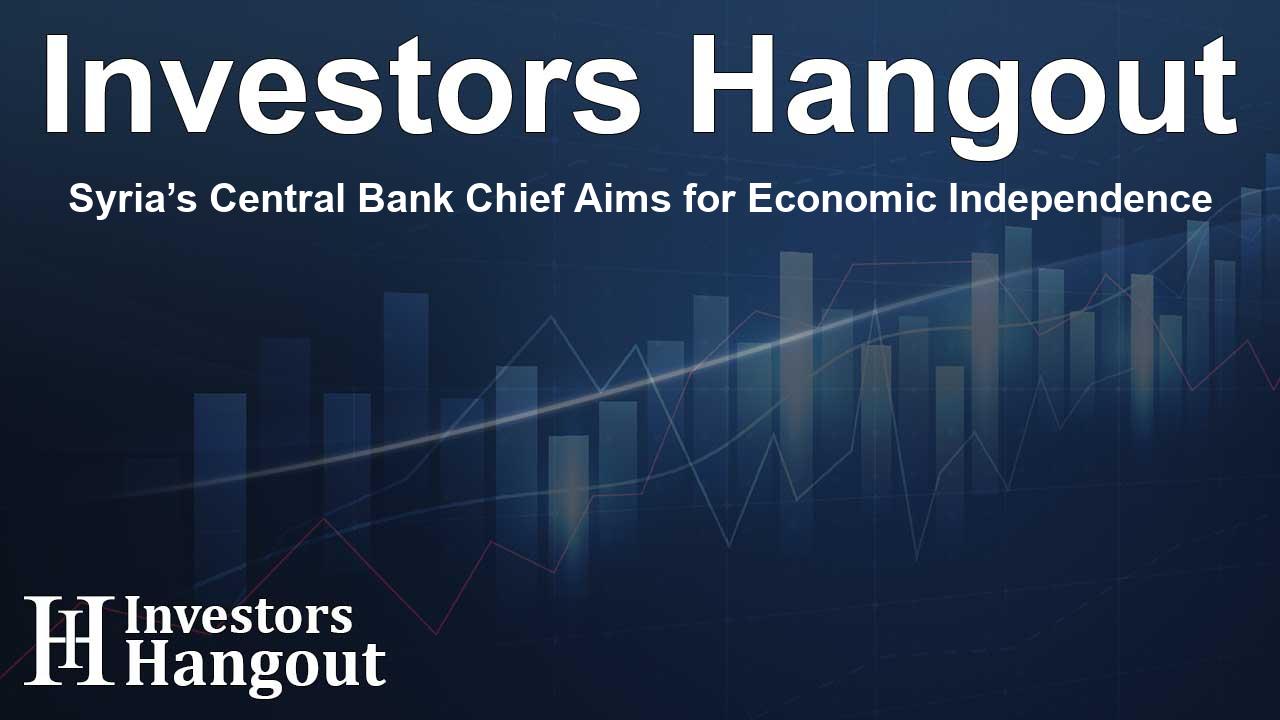Syria’s Central Bank Chief Aims for Economic Independence

Transforming Syria's Banking Landscape
Maysaa Sabreen, the newly appointed governor of Syria's central bank, is set to initiate significant changes within the institution. Her vision is to enhance the bank's independence in making monetary policy decisions, breaking away from the tight grip that characterized the Assad regime. This transition holds the potential for transformative effects on the Syrian economy and represents a crucial shift in governance.
Leadership Transition and Immediate Goals
Sabreen, who previously served as the central bank's deputy, has taken the reins following the resignation of former governor Mohammed Issam Hazime. Her leadership comes at a pivotal moment for Syria, where the political and economic landscape is gradually evolving. One of her primary goals is to draft amendments to existing banking laws to reinforce independence, thereby empowering the central bank to make its own monetary decisions.
Support from New Governance
For these changes to take root, they will require the approval of Syria's newly established governing authority. While details on the timeline for these amendments remain vague, Sabreen is clear in her intent to redefine the central bank's role in the economy.
Importance of Central Bank Independence
Economists emphasize that an independent central bank is vital for ensuring long-term macroeconomic stability. Despite being labeled as independent in its charter, in practice, the Central Bank of Syria operated under stringent government control, leading to decisions that often prioritized short-term political goals over sound economic policy. This approach can hinder growth and undermine confidence in the financial system.
Innovations in Banking Services
Under Sabreen’s guidance, the central bank is also exploring ways to expand Islamic banking. This strategic move aims to attract individuals who have traditionally avoided conventional banking services. By possibly permitting conventional banks to set up Islamic banking branches, Sabreen hopes to offer more inclusive financial services that adhere to Islamic law, which prohibits interest and certain types of investments.
Combating Economic Challenges
One of the most pressing issues Sabreen faces is the rampant inflation affecting the Syrian economy. The central bank’s past dependency on printing currency to support government expenses has directly contributed to soaring inflation rates. Sabreen emphasizes a cautious approach, aiming to avert further currency printing that could exacerbate inflation.
Review of Financial State
Currently, the specifics of Syria’s foreign exchange and gold reserves remain unclear, but reports suggest that the central bank holds approximately 26 tons of gold, valued at around $2.2 billion, alongside a sizable portion of foreign currency. However, the ongoing assessment of the bank’s financial standing underscores the challenges faced in fiscal management.
Addressing Wage Increases and Budget Constraints
Sabreen assured that the central bank is prepared to manage a substantial increase in public sector wages while also ensuring salaries are maintained during the transition. It’s reported that external support, potentially from Qatar, might facilitate this financial boost, especially in light of recent sanctions waivers from the U.S. that allow transactions involving Syrian governance bodies.
Future Vision for the Economy
Stabilizing the Syrian currency is among Sabreen's foremost priorities. Since 2011, the value of the Syrian pound has plummeted, creating dire economic circumstances for everyday citizens. Analysts argue that tackling inflation and restructuring state-owned banks will be crucial to restoring confidence in the financial system.
Embracing a New Financial Era
The lifting of restrictions on foreign currency use marks a pivotal cultural shift in how Syrians interact with their economy. With everyday transactions being carried out more openly, including cash exchanges in public spaces, there lies a growing opportunity for revitalizing financial practices.
Collaborations for Economic Recovery
In support of humanitarian efforts, recent U.S. policy changes now allow for some exemptions to existing sanctions, which could facilitate the flow of aid, energy resources, and remittances into Syria. Allowing personal transfers from expatriates serves as a hopeful step in linking back to the global financial system, a move Sabreen views favorably.
Frequently Asked Questions
What initiatives is Maysaa Sabreen planning for the central bank?
She aims to enhance the central bank's independence and explore the growth of Islamic banking services.
How does Sabreen intend to manage inflation?
She plans to avoid excessive currency printing and focus on stabilizing the currency's value.
What are the implications of an independent central bank?
An independent central bank is crucial for fostering economic stability and encouraging investor confidence.
Why is Islamic banking important for Syria?
Islamic banking could attract individuals who previously avoided traditional banking systems, fostering greater financial inclusion.
What role does the new governing authority play?
The new authority will need to approve proposed changes to banking laws to implement Sabreen's vision for the central bank.
About The Author
Contact Dominic Sanders privately here. Or send an email with ATTN: Dominic Sanders as the subject to contact@investorshangout.com.
About Investors Hangout
Investors Hangout is a leading online stock forum for financial discussion and learning, offering a wide range of free tools and resources. It draws in traders of all levels, who exchange market knowledge, investigate trading tactics, and keep an eye on industry developments in real time. Featuring financial articles, stock message boards, quotes, charts, company profiles, and live news updates. Through cooperative learning and a wealth of informational resources, it helps users from novices creating their first portfolios to experts honing their techniques. Join Investors Hangout today: https://investorshangout.com/
The content of this article is based on factual, publicly available information and does not represent legal, financial, or investment advice. Investors Hangout does not offer financial advice, and the author is not a licensed financial advisor. Consult a qualified advisor before making any financial or investment decisions based on this article. This article should not be considered advice to purchase, sell, or hold any securities or other investments. If any of the material provided here is inaccurate, please contact us for corrections.
